Business Ethics Case Study: Galleon Group Insider Trading Analysis
VerifiedAdded on 2020/04/01
|14
|3912
|82
Case Study
AI Summary
This case study delves into the issue of insider trading, using the Galleon Group as a focal point. It explores the information gathering techniques prevalent on Wall Street, particularly those employed by Raj Rajaratnam, and analyzes the ethical implications of sharing confidential information. The study examines potential solutions to mitigate insider trading, including actions by regulators, investors, and executives. It also discusses the effectiveness of secret investigations in deterring the sharing of non-public information, drawing conclusions on the impact of such practices on market integrity and the responsibilities of stakeholders. The analysis emphasizes the legal and ethical ramifications of insider trading and offers insights into preventing such activities in the securities industry.
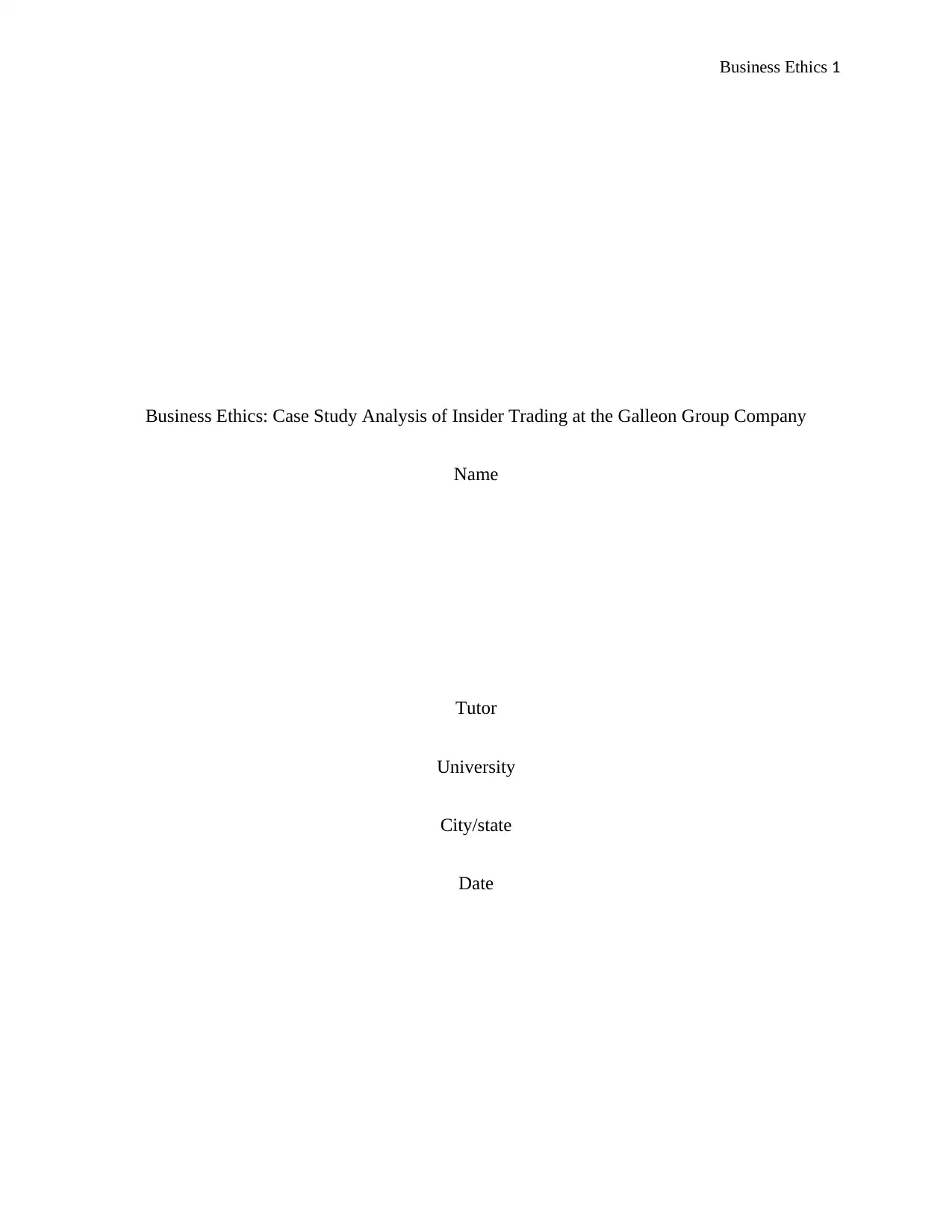
Business Ethics 1
Business Ethics: Case Study Analysis of Insider Trading at the Galleon Group Company
Name
Tutor
University
City/state
Date
Business Ethics: Case Study Analysis of Insider Trading at the Galleon Group Company
Name
Tutor
University
City/state
Date
Paraphrase This Document
Need a fresh take? Get an instant paraphrase of this document with our AI Paraphraser
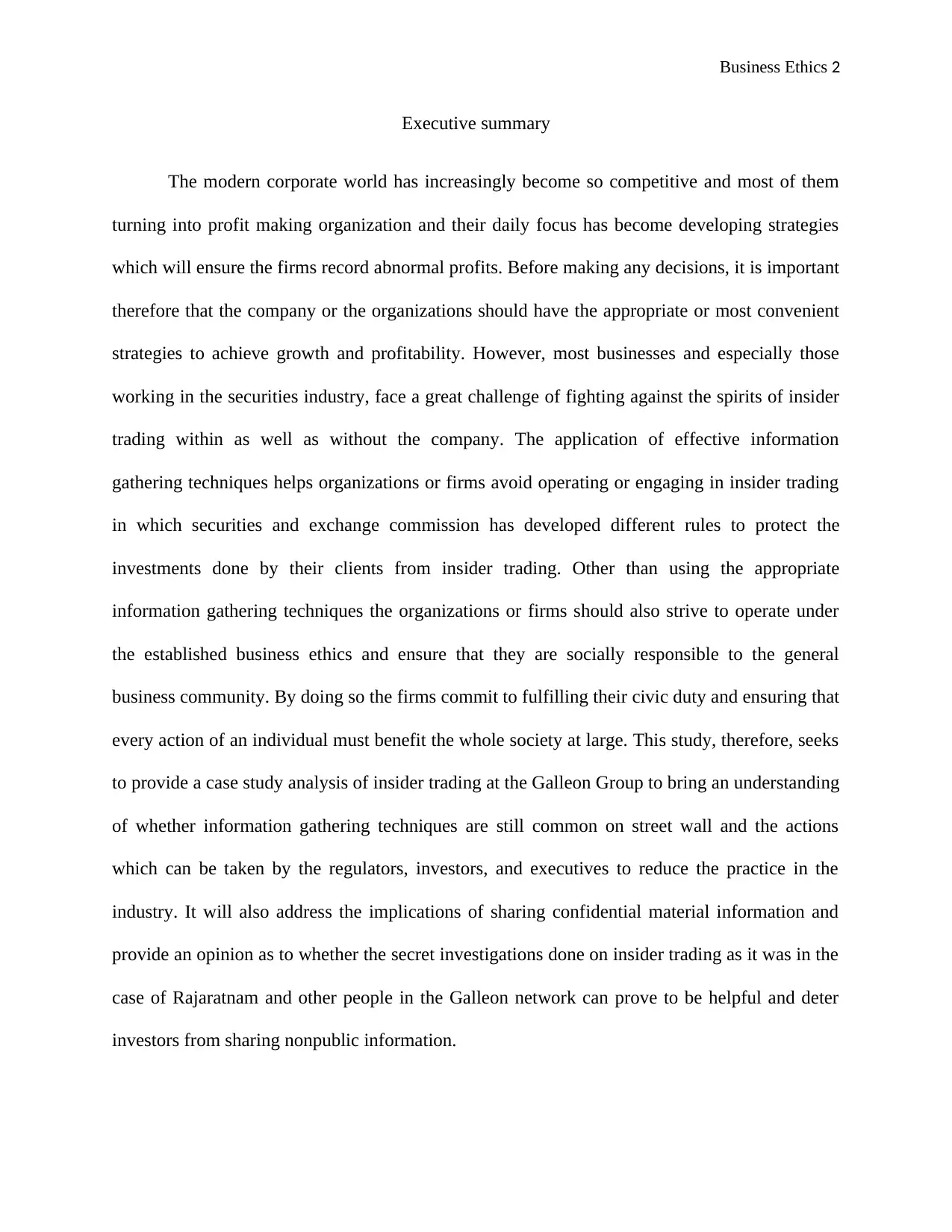
Business Ethics 2
Executive summary
The modern corporate world has increasingly become so competitive and most of them
turning into profit making organization and their daily focus has become developing strategies
which will ensure the firms record abnormal profits. Before making any decisions, it is important
therefore that the company or the organizations should have the appropriate or most convenient
strategies to achieve growth and profitability. However, most businesses and especially those
working in the securities industry, face a great challenge of fighting against the spirits of insider
trading within as well as without the company. The application of effective information
gathering techniques helps organizations or firms avoid operating or engaging in insider trading
in which securities and exchange commission has developed different rules to protect the
investments done by their clients from insider trading. Other than using the appropriate
information gathering techniques the organizations or firms should also strive to operate under
the established business ethics and ensure that they are socially responsible to the general
business community. By doing so the firms commit to fulfilling their civic duty and ensuring that
every action of an individual must benefit the whole society at large. This study, therefore, seeks
to provide a case study analysis of insider trading at the Galleon Group to bring an understanding
of whether information gathering techniques are still common on street wall and the actions
which can be taken by the regulators, investors, and executives to reduce the practice in the
industry. It will also address the implications of sharing confidential material information and
provide an opinion as to whether the secret investigations done on insider trading as it was in the
case of Rajaratnam and other people in the Galleon network can prove to be helpful and deter
investors from sharing nonpublic information.
Executive summary
The modern corporate world has increasingly become so competitive and most of them
turning into profit making organization and their daily focus has become developing strategies
which will ensure the firms record abnormal profits. Before making any decisions, it is important
therefore that the company or the organizations should have the appropriate or most convenient
strategies to achieve growth and profitability. However, most businesses and especially those
working in the securities industry, face a great challenge of fighting against the spirits of insider
trading within as well as without the company. The application of effective information
gathering techniques helps organizations or firms avoid operating or engaging in insider trading
in which securities and exchange commission has developed different rules to protect the
investments done by their clients from insider trading. Other than using the appropriate
information gathering techniques the organizations or firms should also strive to operate under
the established business ethics and ensure that they are socially responsible to the general
business community. By doing so the firms commit to fulfilling their civic duty and ensuring that
every action of an individual must benefit the whole society at large. This study, therefore, seeks
to provide a case study analysis of insider trading at the Galleon Group to bring an understanding
of whether information gathering techniques are still common on street wall and the actions
which can be taken by the regulators, investors, and executives to reduce the practice in the
industry. It will also address the implications of sharing confidential material information and
provide an opinion as to whether the secret investigations done on insider trading as it was in the
case of Rajaratnam and other people in the Galleon network can prove to be helpful and deter
investors from sharing nonpublic information.
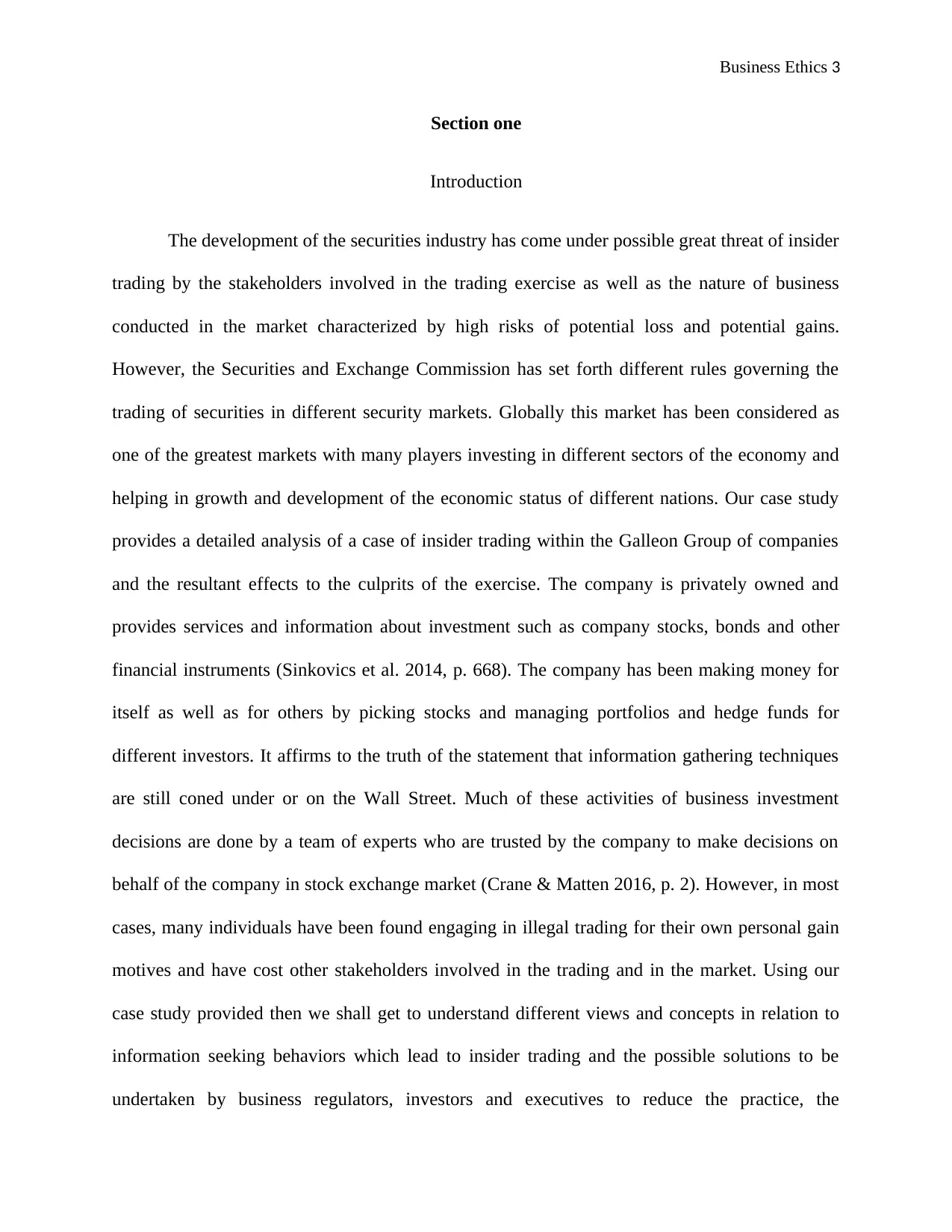
Business Ethics 3
Section one
Introduction
The development of the securities industry has come under possible great threat of insider
trading by the stakeholders involved in the trading exercise as well as the nature of business
conducted in the market characterized by high risks of potential loss and potential gains.
However, the Securities and Exchange Commission has set forth different rules governing the
trading of securities in different security markets. Globally this market has been considered as
one of the greatest markets with many players investing in different sectors of the economy and
helping in growth and development of the economic status of different nations. Our case study
provides a detailed analysis of a case of insider trading within the Galleon Group of companies
and the resultant effects to the culprits of the exercise. The company is privately owned and
provides services and information about investment such as company stocks, bonds and other
financial instruments (Sinkovics et al. 2014, p. 668). The company has been making money for
itself as well as for others by picking stocks and managing portfolios and hedge funds for
different investors. It affirms to the truth of the statement that information gathering techniques
are still coned under or on the Wall Street. Much of these activities of business investment
decisions are done by a team of experts who are trusted by the company to make decisions on
behalf of the company in stock exchange market (Crane & Matten 2016, p. 2). However, in most
cases, many individuals have been found engaging in illegal trading for their own personal gain
motives and have cost other stakeholders involved in the trading and in the market. Using our
case study provided then we shall get to understand different views and concepts in relation to
information seeking behaviors which lead to insider trading and the possible solutions to be
undertaken by business regulators, investors and executives to reduce the practice, the
Section one
Introduction
The development of the securities industry has come under possible great threat of insider
trading by the stakeholders involved in the trading exercise as well as the nature of business
conducted in the market characterized by high risks of potential loss and potential gains.
However, the Securities and Exchange Commission has set forth different rules governing the
trading of securities in different security markets. Globally this market has been considered as
one of the greatest markets with many players investing in different sectors of the economy and
helping in growth and development of the economic status of different nations. Our case study
provides a detailed analysis of a case of insider trading within the Galleon Group of companies
and the resultant effects to the culprits of the exercise. The company is privately owned and
provides services and information about investment such as company stocks, bonds and other
financial instruments (Sinkovics et al. 2014, p. 668). The company has been making money for
itself as well as for others by picking stocks and managing portfolios and hedge funds for
different investors. It affirms to the truth of the statement that information gathering techniques
are still coned under or on the Wall Street. Much of these activities of business investment
decisions are done by a team of experts who are trusted by the company to make decisions on
behalf of the company in stock exchange market (Crane & Matten 2016, p. 2). However, in most
cases, many individuals have been found engaging in illegal trading for their own personal gain
motives and have cost other stakeholders involved in the trading and in the market. Using our
case study provided then we shall get to understand different views and concepts in relation to
information seeking behaviors which lead to insider trading and the possible solutions to be
undertaken by business regulators, investors and executives to reduce the practice, the
⊘ This is a preview!⊘
Do you want full access?
Subscribe today to unlock all pages.

Trusted by 1+ million students worldwide
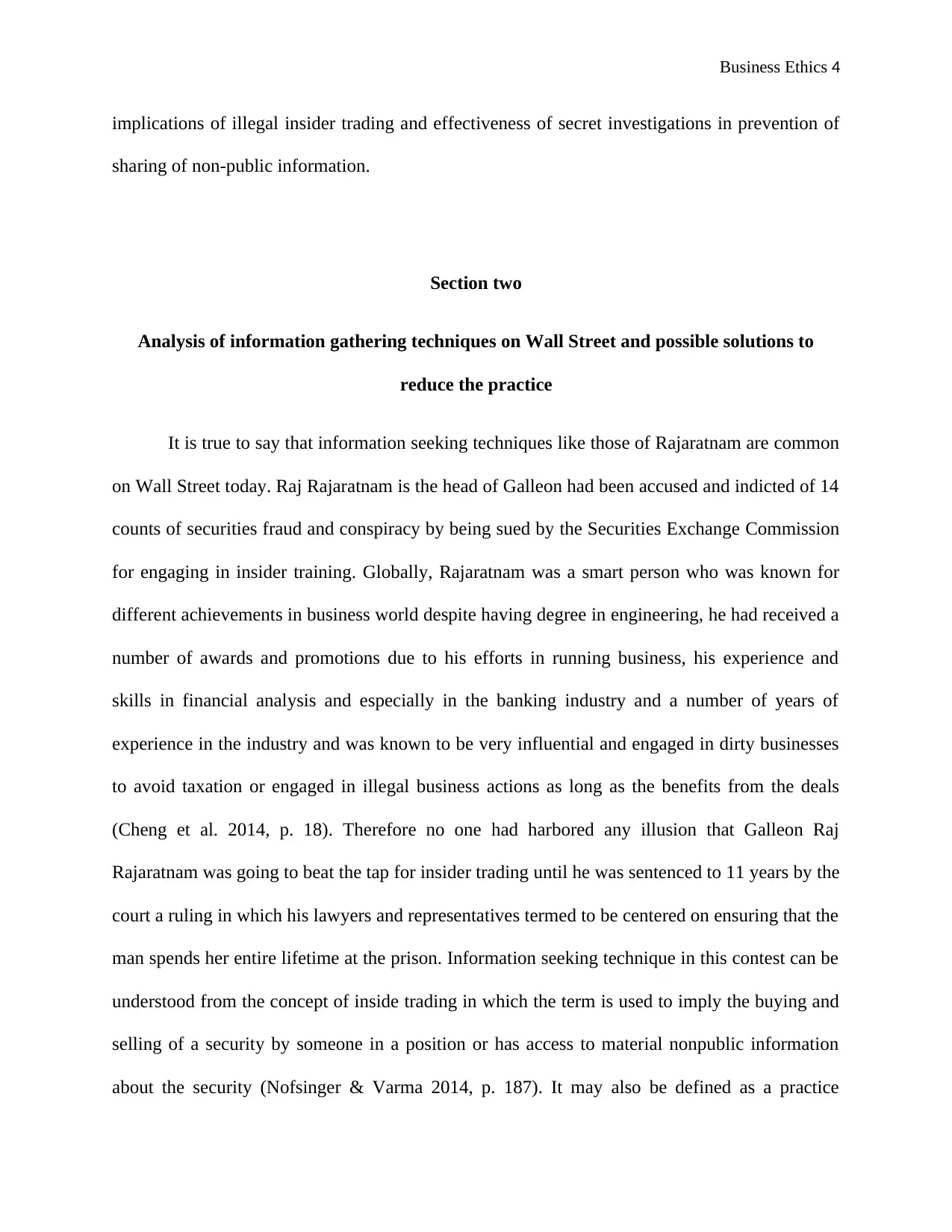
Business Ethics 4
implications of illegal insider trading and effectiveness of secret investigations in prevention of
sharing of non-public information.
Section two
Analysis of information gathering techniques on Wall Street and possible solutions to
reduce the practice
It is true to say that information seeking techniques like those of Rajaratnam are common
on Wall Street today. Raj Rajaratnam is the head of Galleon had been accused and indicted of 14
counts of securities fraud and conspiracy by being sued by the Securities Exchange Commission
for engaging in insider training. Globally, Rajaratnam was a smart person who was known for
different achievements in business world despite having degree in engineering, he had received a
number of awards and promotions due to his efforts in running business, his experience and
skills in financial analysis and especially in the banking industry and a number of years of
experience in the industry and was known to be very influential and engaged in dirty businesses
to avoid taxation or engaged in illegal business actions as long as the benefits from the deals
(Cheng et al. 2014, p. 18). Therefore no one had harbored any illusion that Galleon Raj
Rajaratnam was going to beat the tap for insider trading until he was sentenced to 11 years by the
court a ruling in which his lawyers and representatives termed to be centered on ensuring that the
man spends her entire lifetime at the prison. Information seeking technique in this contest can be
understood from the concept of inside trading in which the term is used to imply the buying and
selling of a security by someone in a position or has access to material nonpublic information
about the security (Nofsinger & Varma 2014, p. 187). It may also be defined as a practice
implications of illegal insider trading and effectiveness of secret investigations in prevention of
sharing of non-public information.
Section two
Analysis of information gathering techniques on Wall Street and possible solutions to
reduce the practice
It is true to say that information seeking techniques like those of Rajaratnam are common
on Wall Street today. Raj Rajaratnam is the head of Galleon had been accused and indicted of 14
counts of securities fraud and conspiracy by being sued by the Securities Exchange Commission
for engaging in insider training. Globally, Rajaratnam was a smart person who was known for
different achievements in business world despite having degree in engineering, he had received a
number of awards and promotions due to his efforts in running business, his experience and
skills in financial analysis and especially in the banking industry and a number of years of
experience in the industry and was known to be very influential and engaged in dirty businesses
to avoid taxation or engaged in illegal business actions as long as the benefits from the deals
(Cheng et al. 2014, p. 18). Therefore no one had harbored any illusion that Galleon Raj
Rajaratnam was going to beat the tap for insider trading until he was sentenced to 11 years by the
court a ruling in which his lawyers and representatives termed to be centered on ensuring that the
man spends her entire lifetime at the prison. Information seeking technique in this contest can be
understood from the concept of inside trading in which the term is used to imply the buying and
selling of a security by someone in a position or has access to material nonpublic information
about the security (Nofsinger & Varma 2014, p. 187). It may also be defined as a practice
Paraphrase This Document
Need a fresh take? Get an instant paraphrase of this document with our AI Paraphraser
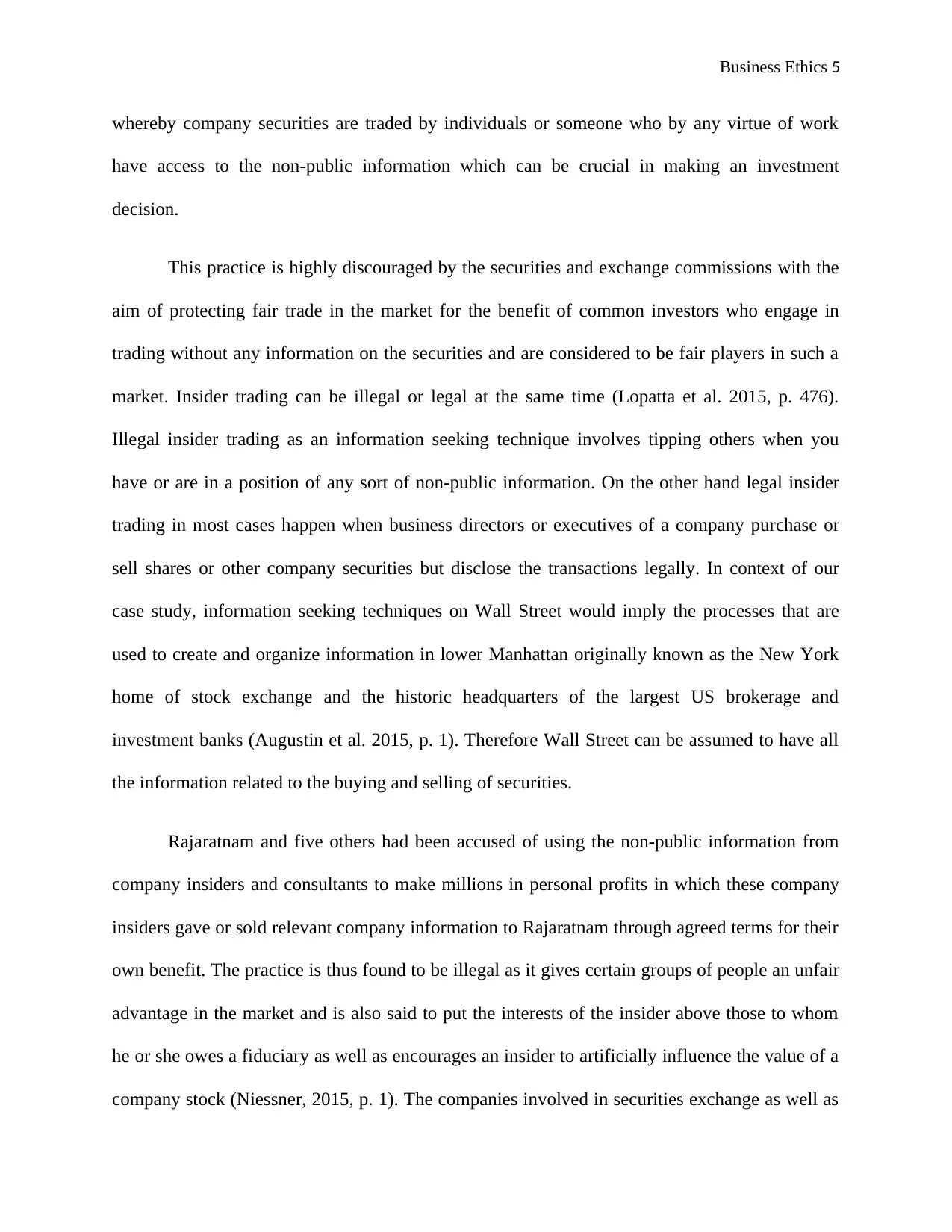
Business Ethics 5
whereby company securities are traded by individuals or someone who by any virtue of work
have access to the non-public information which can be crucial in making an investment
decision.
This practice is highly discouraged by the securities and exchange commissions with the
aim of protecting fair trade in the market for the benefit of common investors who engage in
trading without any information on the securities and are considered to be fair players in such a
market. Insider trading can be illegal or legal at the same time (Lopatta et al. 2015, p. 476).
Illegal insider trading as an information seeking technique involves tipping others when you
have or are in a position of any sort of non-public information. On the other hand legal insider
trading in most cases happen when business directors or executives of a company purchase or
sell shares or other company securities but disclose the transactions legally. In context of our
case study, information seeking techniques on Wall Street would imply the processes that are
used to create and organize information in lower Manhattan originally known as the New York
home of stock exchange and the historic headquarters of the largest US brokerage and
investment banks (Augustin et al. 2015, p. 1). Therefore Wall Street can be assumed to have all
the information related to the buying and selling of securities.
Rajaratnam and five others had been accused of using the non-public information from
company insiders and consultants to make millions in personal profits in which these company
insiders gave or sold relevant company information to Rajaratnam through agreed terms for their
own benefit. The practice is thus found to be illegal as it gives certain groups of people an unfair
advantage in the market and is also said to put the interests of the insider above those to whom
he or she owes a fiduciary as well as encourages an insider to artificially influence the value of a
company stock (Niessner, 2015, p. 1). The companies involved in securities exchange as well as
whereby company securities are traded by individuals or someone who by any virtue of work
have access to the non-public information which can be crucial in making an investment
decision.
This practice is highly discouraged by the securities and exchange commissions with the
aim of protecting fair trade in the market for the benefit of common investors who engage in
trading without any information on the securities and are considered to be fair players in such a
market. Insider trading can be illegal or legal at the same time (Lopatta et al. 2015, p. 476).
Illegal insider trading as an information seeking technique involves tipping others when you
have or are in a position of any sort of non-public information. On the other hand legal insider
trading in most cases happen when business directors or executives of a company purchase or
sell shares or other company securities but disclose the transactions legally. In context of our
case study, information seeking techniques on Wall Street would imply the processes that are
used to create and organize information in lower Manhattan originally known as the New York
home of stock exchange and the historic headquarters of the largest US brokerage and
investment banks (Augustin et al. 2015, p. 1). Therefore Wall Street can be assumed to have all
the information related to the buying and selling of securities.
Rajaratnam and five others had been accused of using the non-public information from
company insiders and consultants to make millions in personal profits in which these company
insiders gave or sold relevant company information to Rajaratnam through agreed terms for their
own benefit. The practice is thus found to be illegal as it gives certain groups of people an unfair
advantage in the market and is also said to put the interests of the insider above those to whom
he or she owes a fiduciary as well as encourages an insider to artificially influence the value of a
company stock (Niessner, 2015, p. 1). The companies involved in securities exchange as well as
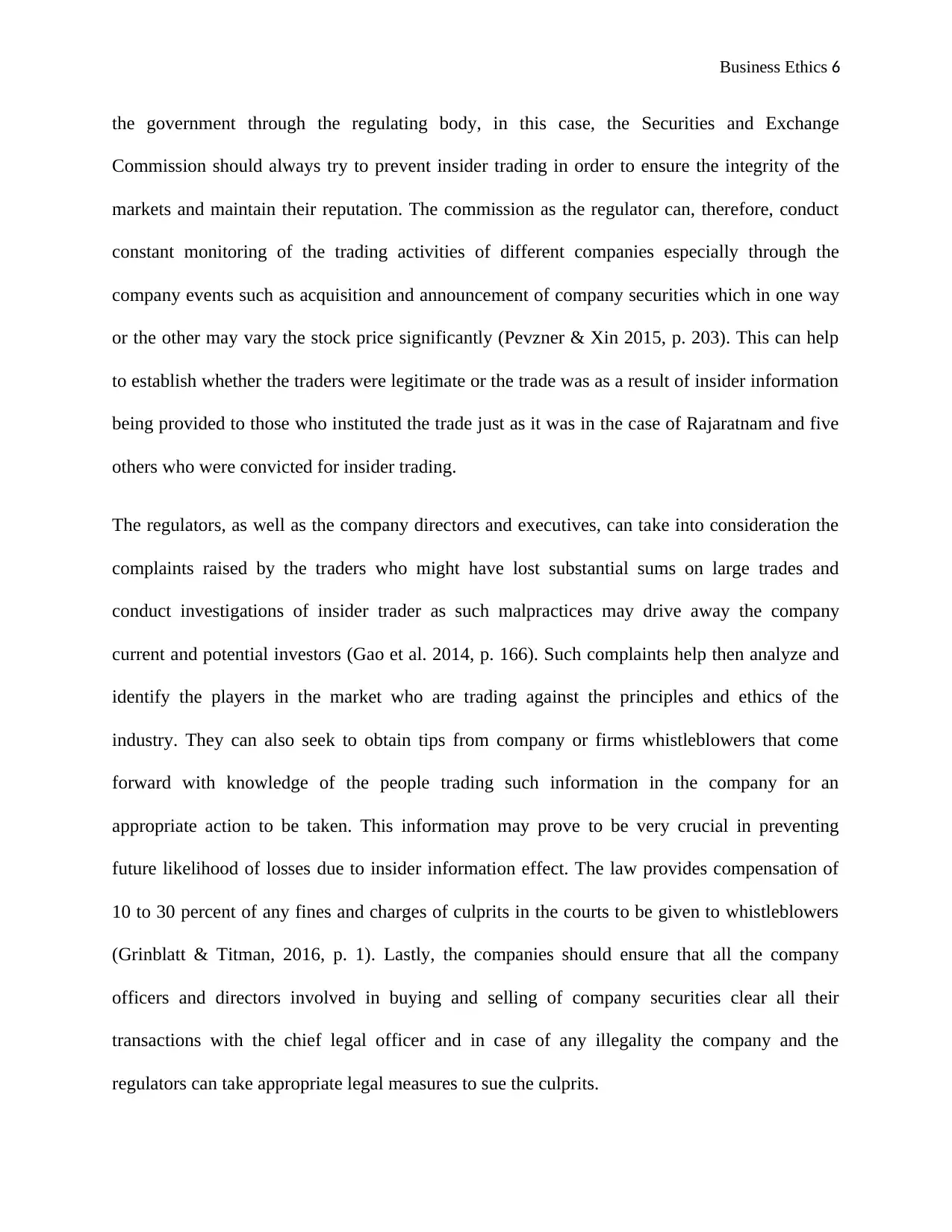
Business Ethics 6
the government through the regulating body, in this case, the Securities and Exchange
Commission should always try to prevent insider trading in order to ensure the integrity of the
markets and maintain their reputation. The commission as the regulator can, therefore, conduct
constant monitoring of the trading activities of different companies especially through the
company events such as acquisition and announcement of company securities which in one way
or the other may vary the stock price significantly (Pevzner & Xin 2015, p. 203). This can help
to establish whether the traders were legitimate or the trade was as a result of insider information
being provided to those who instituted the trade just as it was in the case of Rajaratnam and five
others who were convicted for insider trading.
The regulators, as well as the company directors and executives, can take into consideration the
complaints raised by the traders who might have lost substantial sums on large trades and
conduct investigations of insider trader as such malpractices may drive away the company
current and potential investors (Gao et al. 2014, p. 166). Such complaints help then analyze and
identify the players in the market who are trading against the principles and ethics of the
industry. They can also seek to obtain tips from company or firms whistleblowers that come
forward with knowledge of the people trading such information in the company for an
appropriate action to be taken. This information may prove to be very crucial in preventing
future likelihood of losses due to insider information effect. The law provides compensation of
10 to 30 percent of any fines and charges of culprits in the courts to be given to whistleblowers
(Grinblatt & Titman, 2016, p. 1). Lastly, the companies should ensure that all the company
officers and directors involved in buying and selling of company securities clear all their
transactions with the chief legal officer and in case of any illegality the company and the
regulators can take appropriate legal measures to sue the culprits.
the government through the regulating body, in this case, the Securities and Exchange
Commission should always try to prevent insider trading in order to ensure the integrity of the
markets and maintain their reputation. The commission as the regulator can, therefore, conduct
constant monitoring of the trading activities of different companies especially through the
company events such as acquisition and announcement of company securities which in one way
or the other may vary the stock price significantly (Pevzner & Xin 2015, p. 203). This can help
to establish whether the traders were legitimate or the trade was as a result of insider information
being provided to those who instituted the trade just as it was in the case of Rajaratnam and five
others who were convicted for insider trading.
The regulators, as well as the company directors and executives, can take into consideration the
complaints raised by the traders who might have lost substantial sums on large trades and
conduct investigations of insider trader as such malpractices may drive away the company
current and potential investors (Gao et al. 2014, p. 166). Such complaints help then analyze and
identify the players in the market who are trading against the principles and ethics of the
industry. They can also seek to obtain tips from company or firms whistleblowers that come
forward with knowledge of the people trading such information in the company for an
appropriate action to be taken. This information may prove to be very crucial in preventing
future likelihood of losses due to insider information effect. The law provides compensation of
10 to 30 percent of any fines and charges of culprits in the courts to be given to whistleblowers
(Grinblatt & Titman, 2016, p. 1). Lastly, the companies should ensure that all the company
officers and directors involved in buying and selling of company securities clear all their
transactions with the chief legal officer and in case of any illegality the company and the
regulators can take appropriate legal measures to sue the culprits.
⊘ This is a preview!⊘
Do you want full access?
Subscribe today to unlock all pages.

Trusted by 1+ million students worldwide
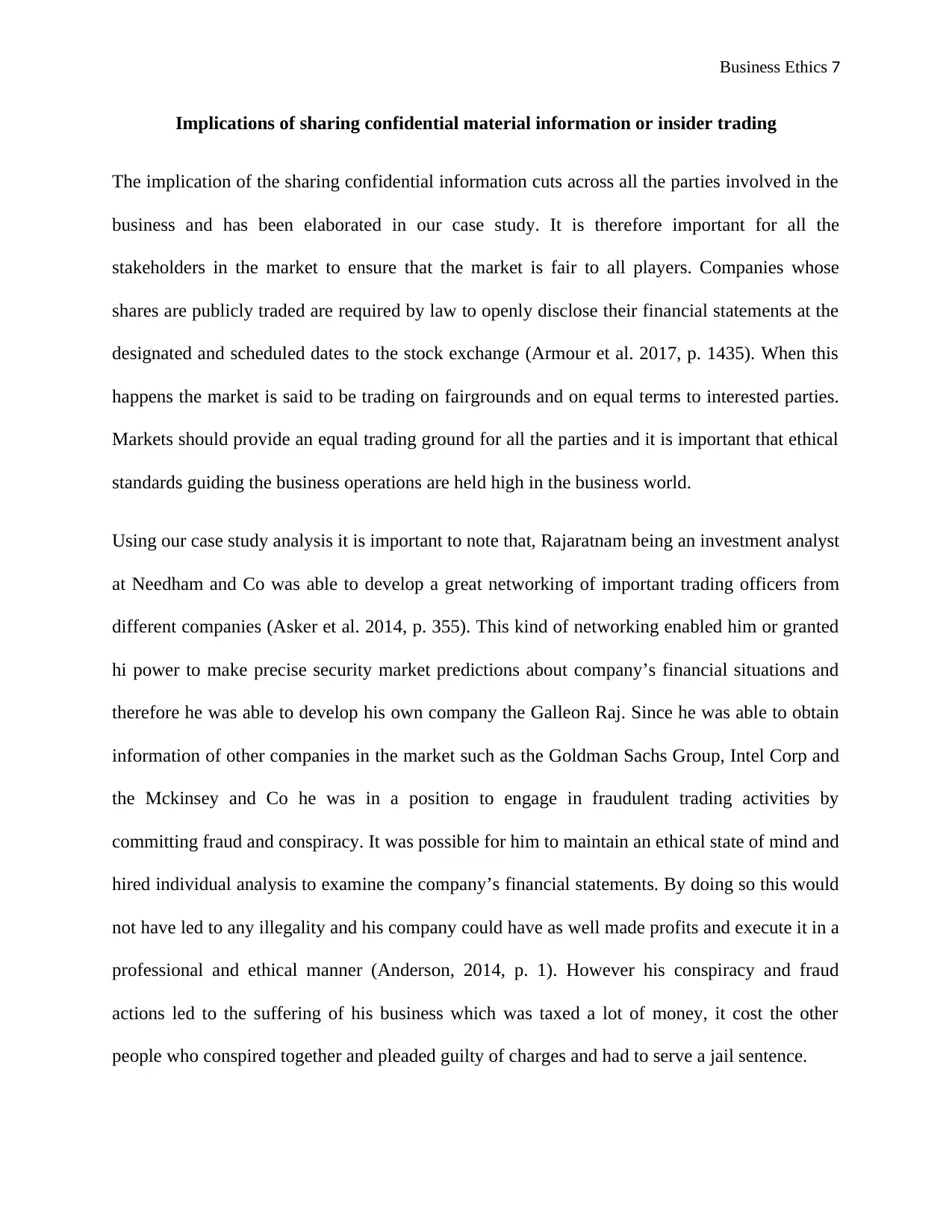
Business Ethics 7
Implications of sharing confidential material information or insider trading
The implication of the sharing confidential information cuts across all the parties involved in the
business and has been elaborated in our case study. It is therefore important for all the
stakeholders in the market to ensure that the market is fair to all players. Companies whose
shares are publicly traded are required by law to openly disclose their financial statements at the
designated and scheduled dates to the stock exchange (Armour et al. 2017, p. 1435). When this
happens the market is said to be trading on fairgrounds and on equal terms to interested parties.
Markets should provide an equal trading ground for all the parties and it is important that ethical
standards guiding the business operations are held high in the business world.
Using our case study analysis it is important to note that, Rajaratnam being an investment analyst
at Needham and Co was able to develop a great networking of important trading officers from
different companies (Asker et al. 2014, p. 355). This kind of networking enabled him or granted
hi power to make precise security market predictions about company’s financial situations and
therefore he was able to develop his own company the Galleon Raj. Since he was able to obtain
information of other companies in the market such as the Goldman Sachs Group, Intel Corp and
the Mckinsey and Co he was in a position to engage in fraudulent trading activities by
committing fraud and conspiracy. It was possible for him to maintain an ethical state of mind and
hired individual analysis to examine the company’s financial statements. By doing so this would
not have led to any illegality and his company could have as well made profits and execute it in a
professional and ethical manner (Anderson, 2014, p. 1). However his conspiracy and fraud
actions led to the suffering of his business which was taxed a lot of money, it cost the other
people who conspired together and pleaded guilty of charges and had to serve a jail sentence.
Implications of sharing confidential material information or insider trading
The implication of the sharing confidential information cuts across all the parties involved in the
business and has been elaborated in our case study. It is therefore important for all the
stakeholders in the market to ensure that the market is fair to all players. Companies whose
shares are publicly traded are required by law to openly disclose their financial statements at the
designated and scheduled dates to the stock exchange (Armour et al. 2017, p. 1435). When this
happens the market is said to be trading on fairgrounds and on equal terms to interested parties.
Markets should provide an equal trading ground for all the parties and it is important that ethical
standards guiding the business operations are held high in the business world.
Using our case study analysis it is important to note that, Rajaratnam being an investment analyst
at Needham and Co was able to develop a great networking of important trading officers from
different companies (Asker et al. 2014, p. 355). This kind of networking enabled him or granted
hi power to make precise security market predictions about company’s financial situations and
therefore he was able to develop his own company the Galleon Raj. Since he was able to obtain
information of other companies in the market such as the Goldman Sachs Group, Intel Corp and
the Mckinsey and Co he was in a position to engage in fraudulent trading activities by
committing fraud and conspiracy. It was possible for him to maintain an ethical state of mind and
hired individual analysis to examine the company’s financial statements. By doing so this would
not have led to any illegality and his company could have as well made profits and execute it in a
professional and ethical manner (Anderson, 2014, p. 1). However his conspiracy and fraud
actions led to the suffering of his business which was taxed a lot of money, it cost the other
people who conspired together and pleaded guilty of charges and had to serve a jail sentence.
Paraphrase This Document
Need a fresh take? Get an instant paraphrase of this document with our AI Paraphraser
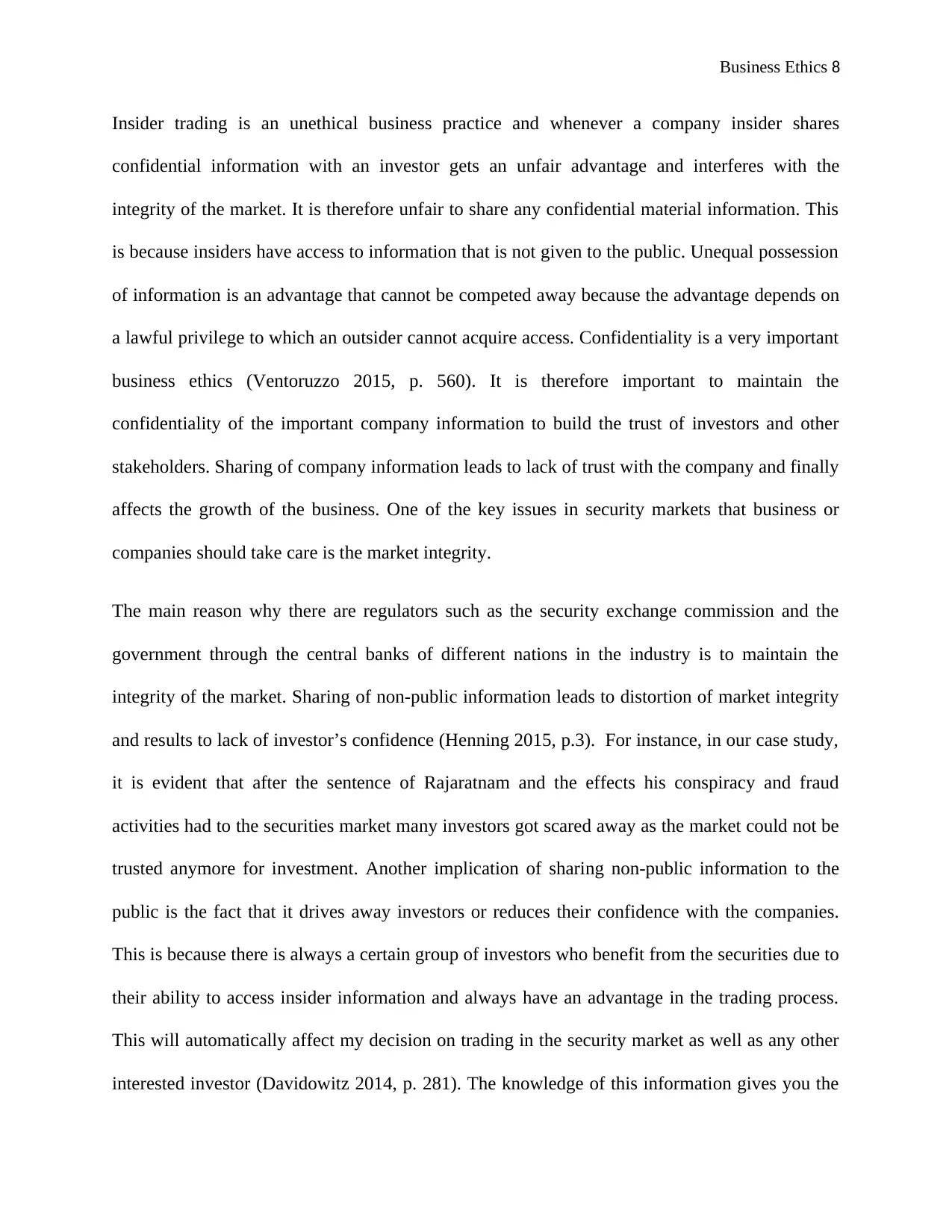
Business Ethics 8
Insider trading is an unethical business practice and whenever a company insider shares
confidential information with an investor gets an unfair advantage and interferes with the
integrity of the market. It is therefore unfair to share any confidential material information. This
is because insiders have access to information that is not given to the public. Unequal possession
of information is an advantage that cannot be competed away because the advantage depends on
a lawful privilege to which an outsider cannot acquire access. Confidentiality is a very important
business ethics (Ventoruzzo 2015, p. 560). It is therefore important to maintain the
confidentiality of the important company information to build the trust of investors and other
stakeholders. Sharing of company information leads to lack of trust with the company and finally
affects the growth of the business. One of the key issues in security markets that business or
companies should take care is the market integrity.
The main reason why there are regulators such as the security exchange commission and the
government through the central banks of different nations in the industry is to maintain the
integrity of the market. Sharing of non-public information leads to distortion of market integrity
and results to lack of investor’s confidence (Henning 2015, p.3). For instance, in our case study,
it is evident that after the sentence of Rajaratnam and the effects his conspiracy and fraud
activities had to the securities market many investors got scared away as the market could not be
trusted anymore for investment. Another implication of sharing non-public information to the
public is the fact that it drives away investors or reduces their confidence with the companies.
This is because there is always a certain group of investors who benefit from the securities due to
their ability to access insider information and always have an advantage in the trading process.
This will automatically affect my decision on trading in the security market as well as any other
interested investor (Davidowitz 2014, p. 281). The knowledge of this information gives you the
Insider trading is an unethical business practice and whenever a company insider shares
confidential information with an investor gets an unfair advantage and interferes with the
integrity of the market. It is therefore unfair to share any confidential material information. This
is because insiders have access to information that is not given to the public. Unequal possession
of information is an advantage that cannot be competed away because the advantage depends on
a lawful privilege to which an outsider cannot acquire access. Confidentiality is a very important
business ethics (Ventoruzzo 2015, p. 560). It is therefore important to maintain the
confidentiality of the important company information to build the trust of investors and other
stakeholders. Sharing of company information leads to lack of trust with the company and finally
affects the growth of the business. One of the key issues in security markets that business or
companies should take care is the market integrity.
The main reason why there are regulators such as the security exchange commission and the
government through the central banks of different nations in the industry is to maintain the
integrity of the market. Sharing of non-public information leads to distortion of market integrity
and results to lack of investor’s confidence (Henning 2015, p.3). For instance, in our case study,
it is evident that after the sentence of Rajaratnam and the effects his conspiracy and fraud
activities had to the securities market many investors got scared away as the market could not be
trusted anymore for investment. Another implication of sharing non-public information to the
public is the fact that it drives away investors or reduces their confidence with the companies.
This is because there is always a certain group of investors who benefit from the securities due to
their ability to access insider information and always have an advantage in the trading process.
This will automatically affect my decision on trading in the security market as well as any other
interested investor (Davidowitz 2014, p. 281). The knowledge of this information gives you the
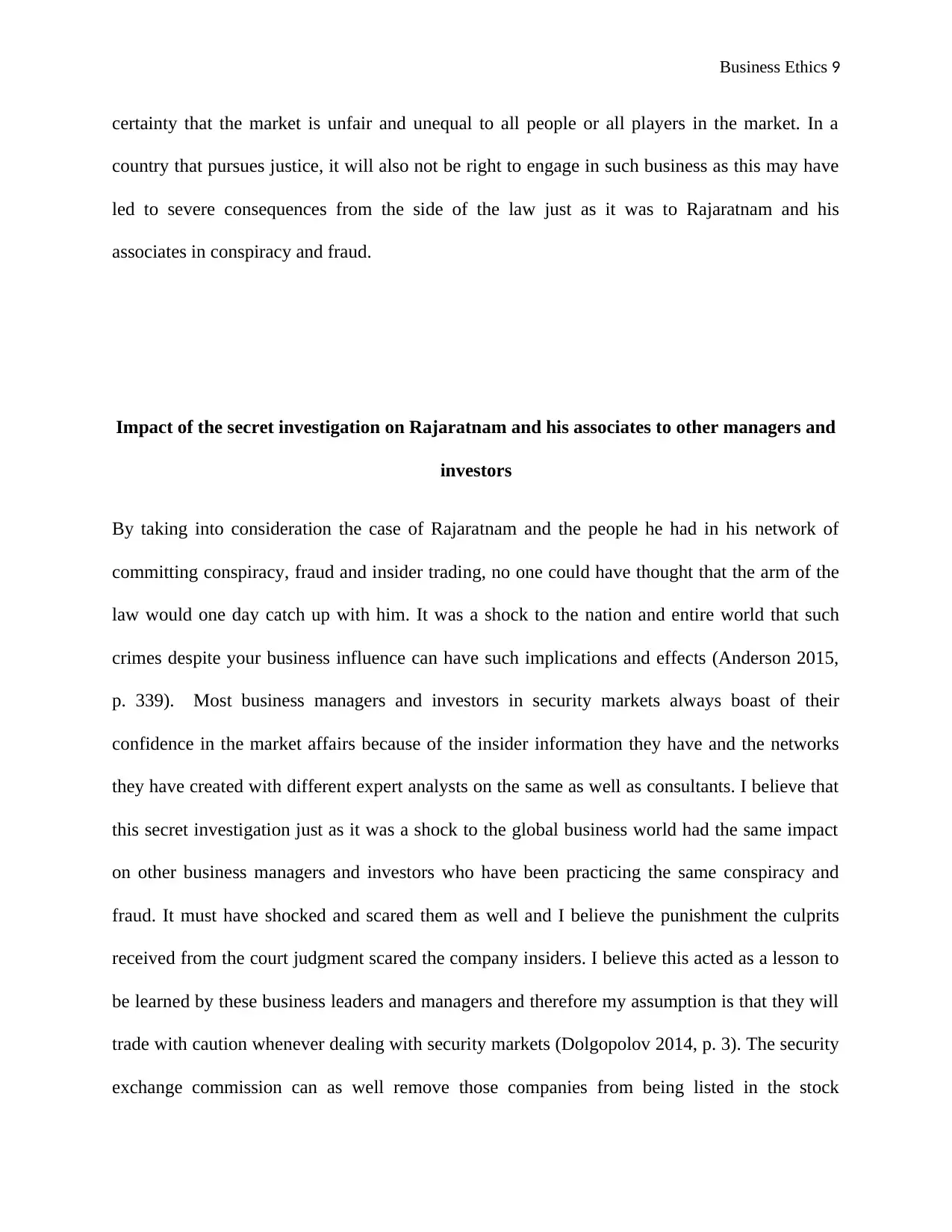
Business Ethics 9
certainty that the market is unfair and unequal to all people or all players in the market. In a
country that pursues justice, it will also not be right to engage in such business as this may have
led to severe consequences from the side of the law just as it was to Rajaratnam and his
associates in conspiracy and fraud.
Impact of the secret investigation on Rajaratnam and his associates to other managers and
investors
By taking into consideration the case of Rajaratnam and the people he had in his network of
committing conspiracy, fraud and insider trading, no one could have thought that the arm of the
law would one day catch up with him. It was a shock to the nation and entire world that such
crimes despite your business influence can have such implications and effects (Anderson 2015,
p. 339). Most business managers and investors in security markets always boast of their
confidence in the market affairs because of the insider information they have and the networks
they have created with different expert analysts on the same as well as consultants. I believe that
this secret investigation just as it was a shock to the global business world had the same impact
on other business managers and investors who have been practicing the same conspiracy and
fraud. It must have shocked and scared them as well and I believe the punishment the culprits
received from the court judgment scared the company insiders. I believe this acted as a lesson to
be learned by these business leaders and managers and therefore my assumption is that they will
trade with caution whenever dealing with security markets (Dolgopolov 2014, p. 3). The security
exchange commission can as well remove those companies from being listed in the stock
certainty that the market is unfair and unequal to all people or all players in the market. In a
country that pursues justice, it will also not be right to engage in such business as this may have
led to severe consequences from the side of the law just as it was to Rajaratnam and his
associates in conspiracy and fraud.
Impact of the secret investigation on Rajaratnam and his associates to other managers and
investors
By taking into consideration the case of Rajaratnam and the people he had in his network of
committing conspiracy, fraud and insider trading, no one could have thought that the arm of the
law would one day catch up with him. It was a shock to the nation and entire world that such
crimes despite your business influence can have such implications and effects (Anderson 2015,
p. 339). Most business managers and investors in security markets always boast of their
confidence in the market affairs because of the insider information they have and the networks
they have created with different expert analysts on the same as well as consultants. I believe that
this secret investigation just as it was a shock to the global business world had the same impact
on other business managers and investors who have been practicing the same conspiracy and
fraud. It must have shocked and scared them as well and I believe the punishment the culprits
received from the court judgment scared the company insiders. I believe this acted as a lesson to
be learned by these business leaders and managers and therefore my assumption is that they will
trade with caution whenever dealing with security markets (Dolgopolov 2014, p. 3). The security
exchange commission can as well remove those companies from being listed in the stock
⊘ This is a preview!⊘
Do you want full access?
Subscribe today to unlock all pages.

Trusted by 1+ million students worldwide
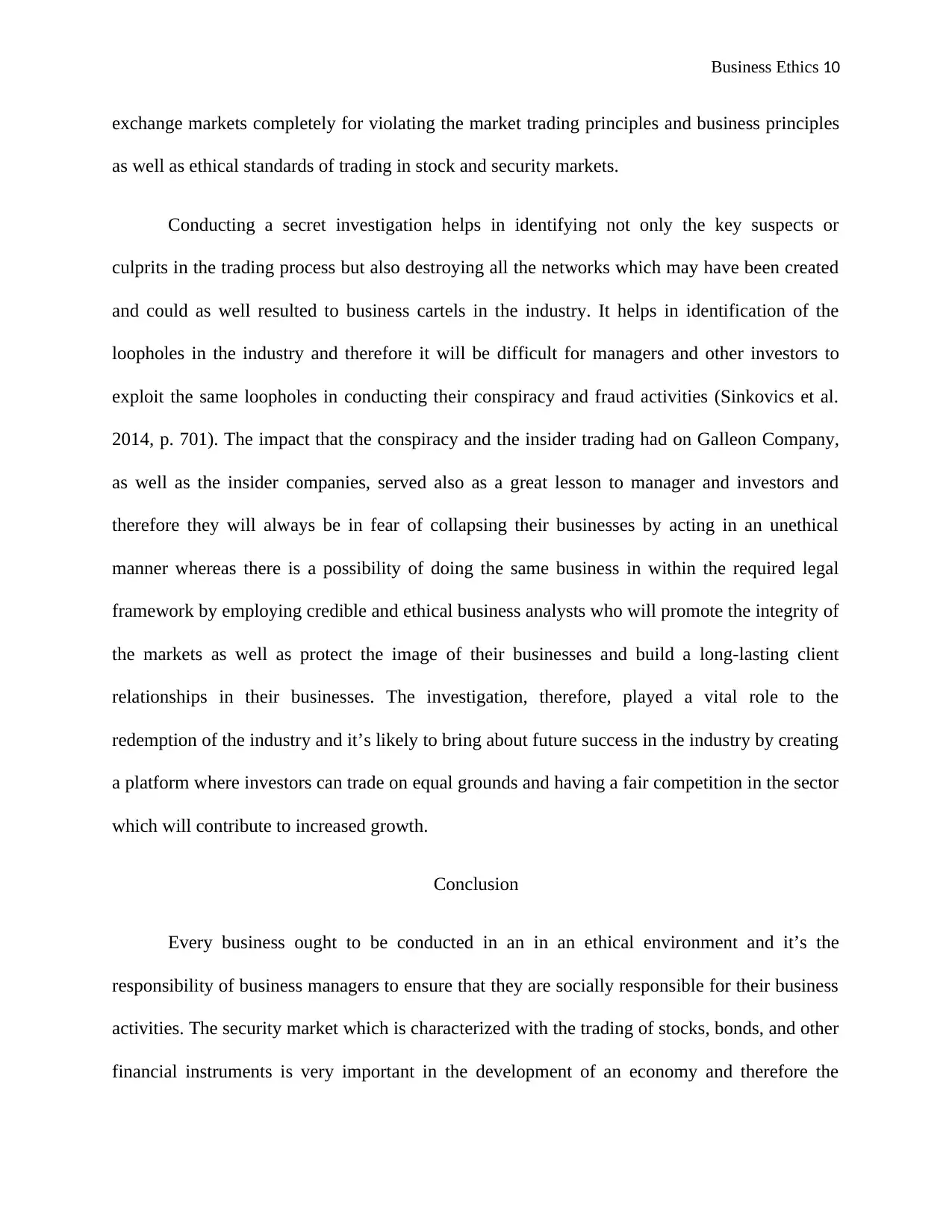
Business Ethics 10
exchange markets completely for violating the market trading principles and business principles
as well as ethical standards of trading in stock and security markets.
Conducting a secret investigation helps in identifying not only the key suspects or
culprits in the trading process but also destroying all the networks which may have been created
and could as well resulted to business cartels in the industry. It helps in identification of the
loopholes in the industry and therefore it will be difficult for managers and other investors to
exploit the same loopholes in conducting their conspiracy and fraud activities (Sinkovics et al.
2014, p. 701). The impact that the conspiracy and the insider trading had on Galleon Company,
as well as the insider companies, served also as a great lesson to manager and investors and
therefore they will always be in fear of collapsing their businesses by acting in an unethical
manner whereas there is a possibility of doing the same business in within the required legal
framework by employing credible and ethical business analysts who will promote the integrity of
the markets as well as protect the image of their businesses and build a long-lasting client
relationships in their businesses. The investigation, therefore, played a vital role to the
redemption of the industry and it’s likely to bring about future success in the industry by creating
a platform where investors can trade on equal grounds and having a fair competition in the sector
which will contribute to increased growth.
Conclusion
Every business ought to be conducted in an in an ethical environment and it’s the
responsibility of business managers to ensure that they are socially responsible for their business
activities. The security market which is characterized with the trading of stocks, bonds, and other
financial instruments is very important in the development of an economy and therefore the
exchange markets completely for violating the market trading principles and business principles
as well as ethical standards of trading in stock and security markets.
Conducting a secret investigation helps in identifying not only the key suspects or
culprits in the trading process but also destroying all the networks which may have been created
and could as well resulted to business cartels in the industry. It helps in identification of the
loopholes in the industry and therefore it will be difficult for managers and other investors to
exploit the same loopholes in conducting their conspiracy and fraud activities (Sinkovics et al.
2014, p. 701). The impact that the conspiracy and the insider trading had on Galleon Company,
as well as the insider companies, served also as a great lesson to manager and investors and
therefore they will always be in fear of collapsing their businesses by acting in an unethical
manner whereas there is a possibility of doing the same business in within the required legal
framework by employing credible and ethical business analysts who will promote the integrity of
the markets as well as protect the image of their businesses and build a long-lasting client
relationships in their businesses. The investigation, therefore, played a vital role to the
redemption of the industry and it’s likely to bring about future success in the industry by creating
a platform where investors can trade on equal grounds and having a fair competition in the sector
which will contribute to increased growth.
Conclusion
Every business ought to be conducted in an in an ethical environment and it’s the
responsibility of business managers to ensure that they are socially responsible for their business
activities. The security market which is characterized with the trading of stocks, bonds, and other
financial instruments is very important in the development of an economy and therefore the
Paraphrase This Document
Need a fresh take? Get an instant paraphrase of this document with our AI Paraphraser
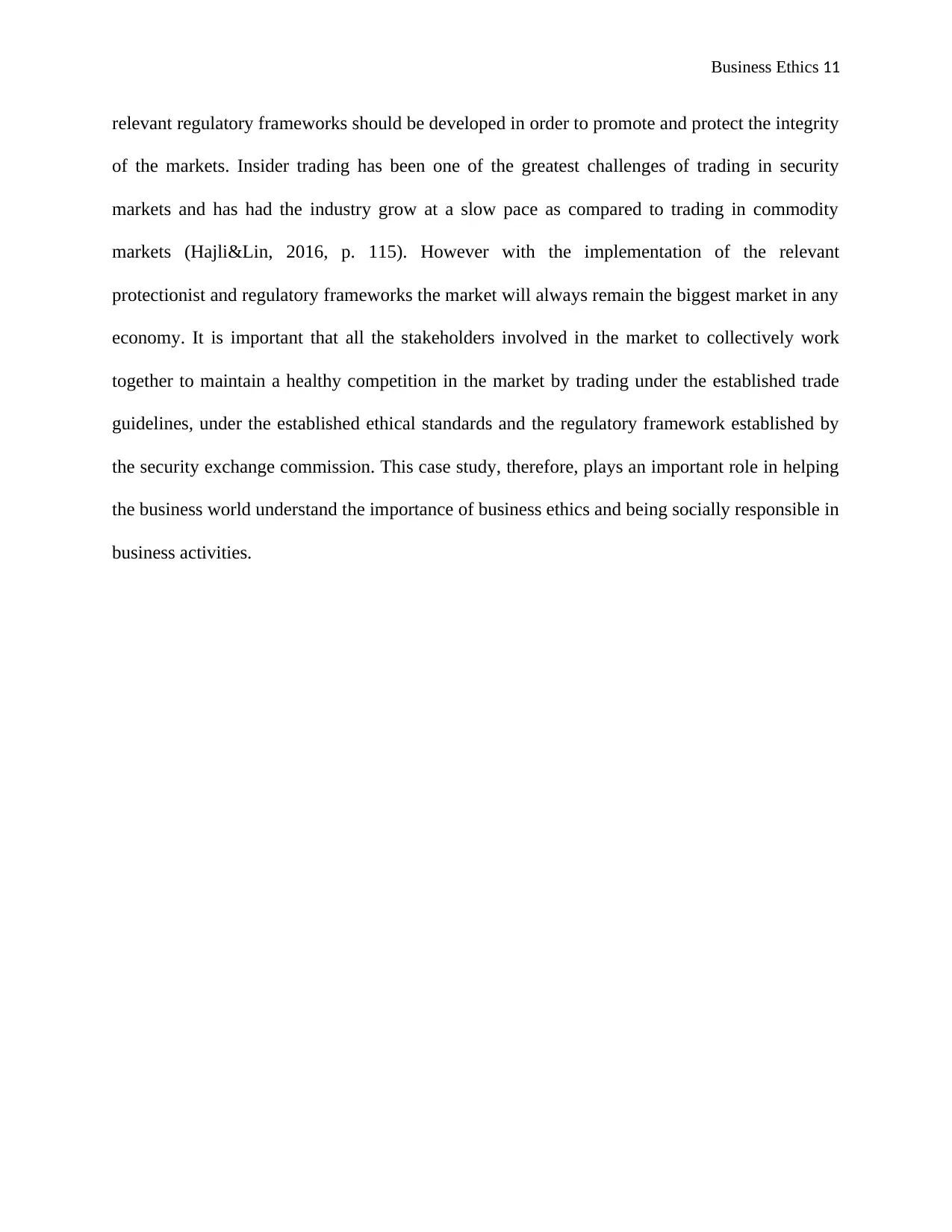
Business Ethics 11
relevant regulatory frameworks should be developed in order to promote and protect the integrity
of the markets. Insider trading has been one of the greatest challenges of trading in security
markets and has had the industry grow at a slow pace as compared to trading in commodity
markets (Hajli&Lin, 2016, p. 115). However with the implementation of the relevant
protectionist and regulatory frameworks the market will always remain the biggest market in any
economy. It is important that all the stakeholders involved in the market to collectively work
together to maintain a healthy competition in the market by trading under the established trade
guidelines, under the established ethical standards and the regulatory framework established by
the security exchange commission. This case study, therefore, plays an important role in helping
the business world understand the importance of business ethics and being socially responsible in
business activities.
relevant regulatory frameworks should be developed in order to promote and protect the integrity
of the markets. Insider trading has been one of the greatest challenges of trading in security
markets and has had the industry grow at a slow pace as compared to trading in commodity
markets (Hajli&Lin, 2016, p. 115). However with the implementation of the relevant
protectionist and regulatory frameworks the market will always remain the biggest market in any
economy. It is important that all the stakeholders involved in the market to collectively work
together to maintain a healthy competition in the market by trading under the established trade
guidelines, under the established ethical standards and the regulatory framework established by
the security exchange commission. This case study, therefore, plays an important role in helping
the business world understand the importance of business ethics and being socially responsible in
business activities.
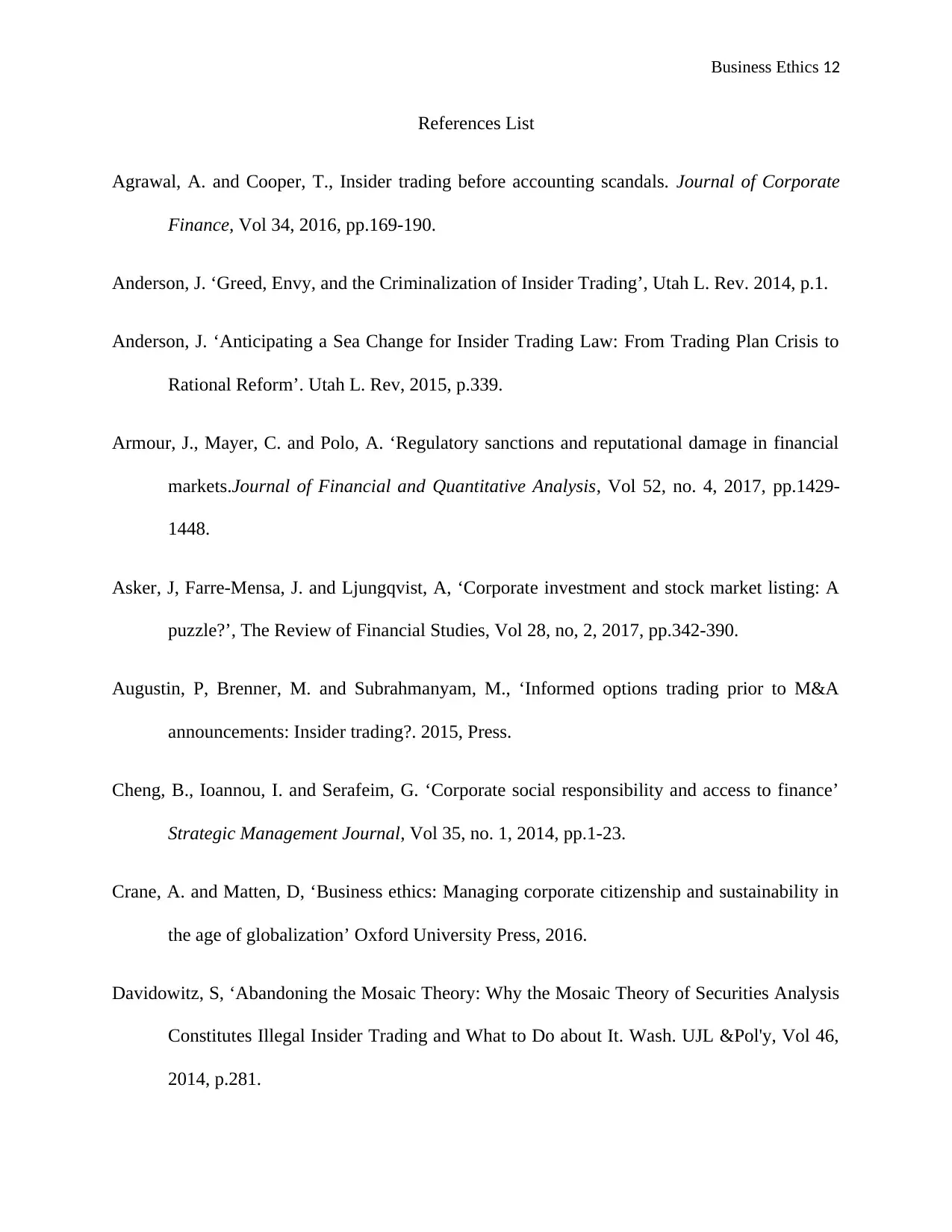
Business Ethics 12
References List
Agrawal, A. and Cooper, T., Insider trading before accounting scandals. Journal of Corporate
Finance, Vol 34, 2016, pp.169-190.
Anderson, J. ‘Greed, Envy, and the Criminalization of Insider Trading’, Utah L. Rev. 2014, p.1.
Anderson, J. ‘Anticipating a Sea Change for Insider Trading Law: From Trading Plan Crisis to
Rational Reform’. Utah L. Rev, 2015, p.339.
Armour, J., Mayer, C. and Polo, A. ‘Regulatory sanctions and reputational damage in financial
markets.Journal of Financial and Quantitative Analysis, Vol 52, no. 4, 2017, pp.1429-
1448.
Asker, J, Farre-Mensa, J. and Ljungqvist, A, ‘Corporate investment and stock market listing: A
puzzle?’, The Review of Financial Studies, Vol 28, no, 2, 2017, pp.342-390.
Augustin, P, Brenner, M. and Subrahmanyam, M., ‘Informed options trading prior to M&A
announcements: Insider trading?. 2015, Press.
Cheng, B., Ioannou, I. and Serafeim, G. ‘Corporate social responsibility and access to finance’
Strategic Management Journal, Vol 35, no. 1, 2014, pp.1-23.
Crane, A. and Matten, D, ‘Business ethics: Managing corporate citizenship and sustainability in
the age of globalization’ Oxford University Press, 2016.
Davidowitz, S, ‘Abandoning the Mosaic Theory: Why the Mosaic Theory of Securities Analysis
Constitutes Illegal Insider Trading and What to Do about It. Wash. UJL &Pol'y, Vol 46,
2014, p.281.
References List
Agrawal, A. and Cooper, T., Insider trading before accounting scandals. Journal of Corporate
Finance, Vol 34, 2016, pp.169-190.
Anderson, J. ‘Greed, Envy, and the Criminalization of Insider Trading’, Utah L. Rev. 2014, p.1.
Anderson, J. ‘Anticipating a Sea Change for Insider Trading Law: From Trading Plan Crisis to
Rational Reform’. Utah L. Rev, 2015, p.339.
Armour, J., Mayer, C. and Polo, A. ‘Regulatory sanctions and reputational damage in financial
markets.Journal of Financial and Quantitative Analysis, Vol 52, no. 4, 2017, pp.1429-
1448.
Asker, J, Farre-Mensa, J. and Ljungqvist, A, ‘Corporate investment and stock market listing: A
puzzle?’, The Review of Financial Studies, Vol 28, no, 2, 2017, pp.342-390.
Augustin, P, Brenner, M. and Subrahmanyam, M., ‘Informed options trading prior to M&A
announcements: Insider trading?. 2015, Press.
Cheng, B., Ioannou, I. and Serafeim, G. ‘Corporate social responsibility and access to finance’
Strategic Management Journal, Vol 35, no. 1, 2014, pp.1-23.
Crane, A. and Matten, D, ‘Business ethics: Managing corporate citizenship and sustainability in
the age of globalization’ Oxford University Press, 2016.
Davidowitz, S, ‘Abandoning the Mosaic Theory: Why the Mosaic Theory of Securities Analysis
Constitutes Illegal Insider Trading and What to Do about It. Wash. UJL &Pol'y, Vol 46,
2014, p.281.
⊘ This is a preview!⊘
Do you want full access?
Subscribe today to unlock all pages.

Trusted by 1+ million students worldwide
1 out of 14
Related Documents
Your All-in-One AI-Powered Toolkit for Academic Success.
+13062052269
info@desklib.com
Available 24*7 on WhatsApp / Email
![[object Object]](/_next/static/media/star-bottom.7253800d.svg)
Unlock your academic potential
Copyright © 2020–2026 A2Z Services. All Rights Reserved. Developed and managed by ZUCOL.





